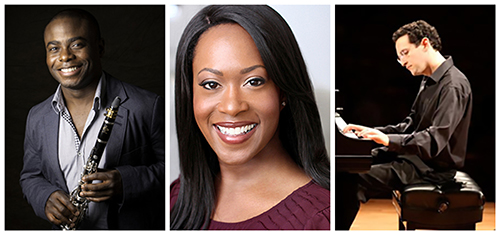by Jacob Strauss

The scheduled program by the McGill/McHale Trio was changed due to the unavailability of flutist Demarre McGill and pianist Michael McHale, but there was no change in expectation for the artistry that was going to occur. Anthony McGill is world-renowned, and Daniel Schlosberg is a talented composer and performer who has collaborated with some of our best contemporary musicians.
Jackson began the program with a recitation of Langston Hughes’ poem “Helen Keller” — the first of five poems by Hughes that served as interludes between each piece on the first half. Jackson recited all of them beautifully, allowing each verse to sing.
McGill and Schlosberg performed Debussy’s Première Rhapsodie for clarinet and piano, a short composition that highlighted the various tones and expressions of the clarinet. James Lee III’s Principal Brothers No. 3 for solo clarinet provided a contrast to Jackson’s heartbeating recitation of “Danse Africaine.” It ran and climbed and descended, and McGill played it electrically.
After the poem “In Time of Silver Rain,” Schlosberg played Quejas, ó La Maja y el ruiseñor from Goyescas, by Enrique Granados, inspired by Goya’s melancholic and flamboyant La Maja. Schlosberg must have been listening to the summer rain and the breath of breaking clouds before the concert, as his performance was colorful and tender.
McGill transformed his clarinet into a charismatic, forlorn soprano in Rachmaninoff’s Vocalise, Op. 34, No. 14, and Schumann’s Fantasiestüke, Op. 7. The repertoire for high voice finds a perfect companion in the clarinet, as it models the proper technique for singers to produce sound through a straight and vertical passage. McGill’s expressions never faltered, and his performance rivaled any vocalist’s.
Poulenc’s Clarinet Sonata, and Brahms’ Sonata in E-flat Major, Op. 120, No. 2, rounded out the program. The Poulenc was cosmopolitan–in the Allegro con fuoco, McGill and Schlosberg gave the impression of traffic passing around a Parisian roundabout, pedestrians weaving in and out, little motors scooting by, cast under the light of a vibrant day.
The much more Romantic Brahms was a perfect conclusion to the program, from the lovely melody in the Allegro Amabile played by McGill with breathtaking simplicity, through the stately and marital Allegro appassionato, into the resolution of the Andante con moto–Allegro where it begins without echoes, only responses. At the end, an image of an old man in a cardigan attempts to rise from a chair, and a child runs by and whisks the hat off his head and laughs while disappearing around the corner.
McGill plays without extravagance, embodying the music as a true artist luxuriating in simplicity. Schlosberg accompanied him marvelously, matching McGill’s artistic spirit. The mix of works from the clarinet canon, a new composition, and arrangements of songs gave the audience an illuminated idea of the instrument’s versatility within its distinct sound, and who better to deliver that than a master in their craft.
Published on ClevelandClassical.com July 29, 2022.
Click here for a printable copy of this article



